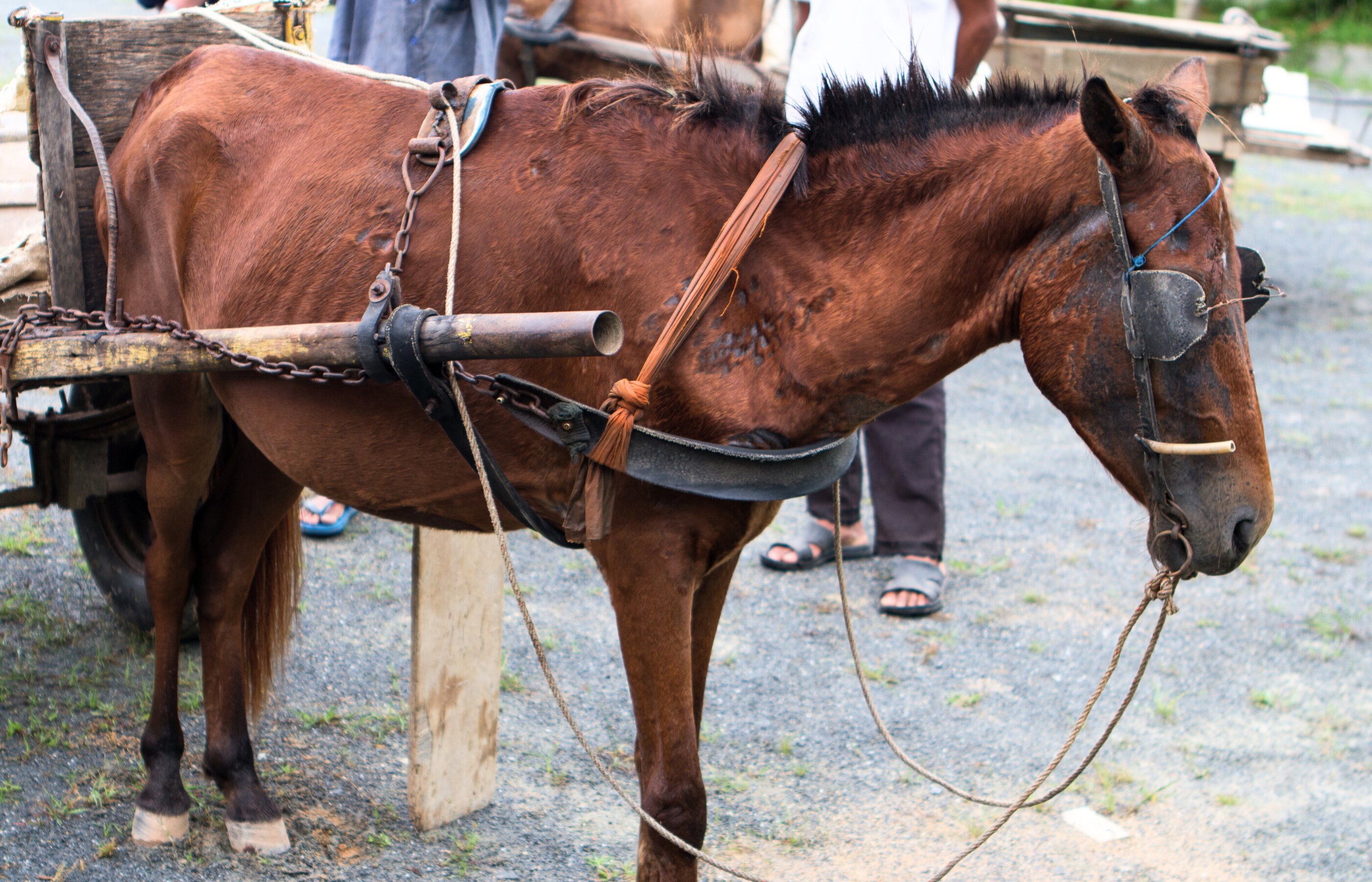Our impact on work and production horses

We help working horses, donkeys and mules that sustain livelihoods.
We help horses in work and production around the world through care, research, education, and influence:

Care
- Our project teams and in-country partners have helped over 75,000 working equines by providing hands-on care and sharing their knowledge with owners
- A network of community-based equine welfare advisors (CBEAs) has been identified and upskilled by many of our partner projects, taking a ‘train the trainer’ approach. The CBEAs act as a first point of call for equid-owners, ensuring they always have someone to advise on equine issues
- We aim to strengthen pre-existing networks for sustainable development. We also collaborate with key local stakeholders, including those working in human and environmental sectors, to maximise impact and address problems holistically
- One Health, One Welfare: this concept emphasises the link between animal welfare, human health, and the environment. In Lesotho, for example, we partner with Riders for Health who use horses and riders to transport medical samples and treatments in remote and mountainous regions
- Our appeal to help Ukrainian horses and their owners, which launched early in 2022, received astounding support and has made it possible to provide vital supplies and much-needed expert care to horses and owners affected by the conflict

Research
- Our international work is evidence-based: research and learning inform our project objectives and ensuring that our work is based on the key needs of the community. We explore research themes which are important at community, national, and international levels. These themes will be used to inform our future work, to monitor and evaluate our projects, and to influence key decision makers
- We aim to inspire young people from around the world to work with working equids. Our undergraduate bursary scheme aims to support the vets of tomorrow to develop their knowledge of equine welfare. Recent projects include an investigation into the work and welfare of pack equids in the Subtropical Highlands of Guatemala and the contribution of working equids to the livelihoods of Guatemalan women
- We work in partnership with a number of universities to investigate working equid topics. For example, our partner Fundación Arrieros Colombia is working in partnership with University of Nottingham, UK, and CES Universidad, Colombia, undertaking a project assessing understanding of and attitudes to colic among working equid owners, with the aim of developing an educational programme
- Recent peer reviewed work across our international programme includes:
- The Global Contributions of Working Equids to Sustainable Agriculture and Livelihoods in Agenda 2030
- The Impact of COVID-19 on the Working Equid Community: Responses from 1530 Individuals Accessing NGO Support in 14 Low- and Middle-Income Countries
- Owners’ Knowledge and Approaches to Colic in Working Equids in Honduras
- ‘All My Animals Are Equal, but None Can Survive without the Horse’. The Contribution of Working Equids to the Livelihoods of Women across Six Communities in the Chimaltenango Region of Guatemala

Education
- Working with in-country partners, we’ve improved horse care, vet and farriery services in 300 communities in 18 countries through practical training programmes
- By sharing vital horse-care knowledge, we’ve ensured better welfare for over 320,000 working equines in Africa, Latin America and Asia
- Our programme uses behavioural science methodologies to ensure that participants in our projects engage with changes to improve equine welfare
- Our partner projects help to identify local solutions which are accessible for the context in which they are working – for example, advising the use of clean salt water to cleanse wounds instead of harmful practices such as applying petrol
- Since the advent of the pandemic, our teams have explored alternative ways to engage with horse owners and professionals, and the resulting webinars and online learning platform have been very successful

Influence
- We’ve influenced legislation that helped reduce the number of horses transported long-distances across Europe for slaughter by 75% (from ~80k in 2010 to ~20k in 2020)
- Working in partnership with industry, NGOs and the European Commission, we’ve helped to produce guidance for transporters to improve compliance with welfare regulations
- We’ve lobbied to protect equines used in the production of Ejiao and Equine Chorionic Gonadotrophin (ECG)
- We engaged in the development and publication of OIE chapter 7.12 on the welfare of working equids
- We’ve raised awareness among UN, FAO (Food and Agriculture Organization), WOAH(World Organization for Animal Health), and World Bank of the contribution of working equines to the Sustainable Development Goals
- Our partner project Animal Nepal has been acting as a consultant to the FAO during an outbreak of zoonotic disease Glanders, ensuring that stakeholders at multiple levels (equid owners, brick kiln owners, vets, paravets and government) are aware of the risks of the disease and how to prevent it

Help working horses, ponies and donkeys today
Your donation can help provide care and training, improving equine welfare in Cambodia, South Africa, Colombia, and beyond.
